Karlovac Mayor Says Marking Victory Over Fascism Day For Sake of Victims, Not Victors
ZAGREB, 9 May 2022 - Leaders of Karlovac County and the City of Karlovac on Monday laid wreaths at the Jamadol cemetery, with Karlovac Mayor Damir Mandić saying that they commemorate the day for the sake of the victims and not the victors.
The office of the mayor, who is a member of the HDZ party, said that modern-day Croatia was founded on antifascism and the fight against all totalitarian regimes.
Mandić said that they were commemorating the millions of victims who in the 20th century paid with their lives during "the rampage of totalitarianism, Fascism, Ustashism and Communism."
"Commemorations like these are held for the sake of the victims, not the victors. Notably, if we remember that in communist countries the victory turned into a defeat because under the guise of antifascism and victory, freedom and democracy were abolished," said Mandić.
The office of Karlovac County head Martina Furdek Hajdin, also a member of the ruling HDZ party, said that she laid a wreath and lit a candle on Europe Day in memory of the victims of all totalitarian regimes.
"Unfortunately we are again witnessing a war in Europe, an aggression on Ukraine and the suffering of innocent victims, which even more underlines the importance of strengthening the values of democracy and unity in Europe," she said.
For more, check out our politics section.
PM Andrej Plenković: Government is Sponsor of Antifascism Anniversary
ZAGREB, 22 June, 2021 - Prime Minister Andrej Plenković said at the Antifascist Struggle Day commemoration on Tuesday that this year the government was organising the observation of that public holiday and that it would be the same in the future, noting that the turbulent time of war should be viewed in all its complexity.
"I am pleased to greet you on behalf of the government on the occasion of Antifascist Struggle Day here in Brezovica forest," said Prime Minister Plenković in his speech at the central Antifascist Stuggle Day commemoration at Brezovica Memorial Park near Sisak, adding that the holiday was established in 1991 at the initiative of then president Franjo Tuđman.
The prime minister recalled that at the beginning of summer 1914 Hitler's Germany had taken control of most of Europe and had begun its senseless and criminal policy in which about six million European Jews had been killed and that after the occupation of Yugoslavia, "the Quisling NDH regime" had been established in Croatia.
Croatia had largest resistance movement in Europe relative to its population
"In reality Croatia was divided into German and Italian occupation zones, while most of Dalmatia, Gorski Kotar and Primorje were annexed to Italy after NDH authorities ceded them to fascist Italy, and racial laws were passed against Jews, Roma and Serbs," Plenković said.
He pointed out that 80 years ago about 70 fighters, mostly Croatian, had established the first Sisak Partisan resistance movement in Brezovica forest.
"Among them was a young Janko Bobetko, who would become a Croatian Army General and Chief of Staff of the Armed Forces in the 1990s," the prime minister said.
He added that the Partisan movement in Croatia had 7,000 members, including many Croatian Serbs.
Plenković underscored that Croatia had had the largest resistance movement in Europe relative to its population.
"Last year we marked the 25th anniversary of the great victory in Operation Storm and the Homeland War, and then I said that we also mourned the victims of crimes committed by Croatia, which unfortunately happened, because a legitimate right to defence is not an excuse for crimes," the prime minister said.
Totalitarian regime in Yugoslavia betrayed antifascists
He added that regardless of the merits of Croatian Partisans, that turbulent time should be viewed in all its complexity.
Plenković said he was thinking primarily of the post-war crimes of the JNA (Yugoslav People's Army) near Bleiburg, Austria and the mass executions of disarmed soldiers and civilians along marches back to Yugoslavia, which he said was traumatic for many families, and which deepened the disastrous divisions in post-war Croatia.
He also underscored that the totalitarian regime in Yugoslavia had betrayed antifascists.
Here I'm thinking of post-war purges of political dissidents, such as the persecution of the Blessed Cardinal (Alojzije) Stepinac, who in his sermons publicly opposed the persecution of Serbs and Jews, and saved many of them from death, Plenković said.
Close divisions still present in society
Plenković said that the time had come for us Croatia a society to take a more sober view of the events of that time and to better evaluate the contribution of the Croatian antifascist resistance to Nazism.
"Only in that way will we close the divisions still present in our society and build the unity necessary to face the challenges ahead of us. Today we finally have a free democratic Croatia, a member of the EU and NATO, whose foundations are in the democratically expressed will of citizens and the victory of the defenders in the Homeland War, which also implies the value of antifascism," Plenković stressed.
He said that after the pandemic and last year's earthquakes, and in the context of increasingly rapid climate change, which would be by far the greatest challenge for the world in the future, Croatia needed unity and to look to the future more than ever.
"Therefore, it is up to all of us to rise to the task that awaits us," Plenković said.
For more about politics in Croatia, follow TCN's dedicated page.
President Zoran Milanović Says Croatia Was on the Side of Good in WWII
ZAGREB, 22 June, 2021 - President Zoran Milanović said on Tuesday, speaking on Antifascist Struggle Day, that "the truth is a deep water," that it could hurt, but that there was nothing painful in Croatia's truth and that in WWII Croatia was not just on the side of the winners but on the side of good, too.
"The truth is a deep water and shouldn't offend anyone, but it can hurt. However, in this truth of ours there is nothing painful, it is actually beautiful. Difficult, bloody, but beautiful," Milanović said in his address at the central Antifascist Struggle Day commemoration in Brezovica Memorial Park near Sisak.
The commemoration was organised by the government and was attended by Prime Minister Andrej Plenković for the first time. This was the first time he and Milanović attended an event together after months of conflict over the selection of a new Supreme Court president.
We are doing Sisak Partisans no favor if we constantly underline they were Croats
Talking about the establishment of the First Sisak Partisan detachment 80 years ago today, Milanović said it was formed by "77 Sisak communists, revolution fighters, fighters for a better order and change."
He said "we are not doing a favour" to those people by constantly underlining that they were Croats and that that was a Croatian struggle. "Yes... they were all Croats. However, they were first and foremost communists fighting for revolution, for a Soviet Croatia, not democracy."
"Those were heroes, heroes of calibre, but other people as well, adventurers who often crossed the line and committed an injustice. All that is our history, our truth. It doesn't offend, it shouldn't be better."
Croatia was on the side of the truth and good
Milanović said he did not come to Brezovica to "force my truth on anyone" but to point to things that put Croatia where it belonged.
"Croatia wasn't just on the side of the winners, Croatia was on the side of the truth and good, the majority of the Croatian people and Croatian Serbs. To point out all the time that they were winners and not losers is a risky look on life and destiny. It means that we could have lost had the Axis, for example, won the war. Would that have made our resistance any less worthy?"
Croatia was also on the side of risk, danger and courage, therefore Croatia, just as Slovenia, Bosnia and Herzegovina, Serbia, and Montenegro, has a deep reason to celebrate Antifascist Struggle Day, Milanović said.
The Sisak detachment was not the first one formed in Europe, but there was a symbiosis of the antifascist struggle that took place in Žabno and then in Sisak a month later, on 22 July 1941, when Ustasha forces surrounded the Partisans, he said.
Uprising with Serb brothers and sisters to preserve humanity
After that, the fighters went to the Banija region "to rise up to arms, together with our Serb brothers and sisters, to preserve humanity."
"Communist agitation on the one hand while on the other, because at that time the Croatian people wasn't ready for an uprising, the Serb people in Croatia, our brothers in arms in that war. Together with Croatian officers, they carried that people's uprising. It happened in Kordun and Banija."
Speaking of the role of Croats in WWII, Milanović said that joining the antifascist struggle was "an act of incredible bravery" for them because they lived in relative comfort in comparison with Serbs and Jews, who were persecuted and killed in the Nazi-styled 1941-45 Independent State of Croatia.
He said there were still people in Croatia, not just a few, who did not approve of celebrating Antifascist Struggle Day, "but that's how it is in a political system." He also underlined the fact that the whole state leadership was at today's commemoration.
For more about politics in Croatia, follow TCN's dedicated page
President Zoran Milanović: "No Progress Without Harmony Among Croatian People"
ZAGREB, 22 June, 2021 - President Zoran Milanović attended a concert by the Croatian Navy Orchestra held in commemoration of Antifascist Struggle Day in Split on Monday evening, where he said that without harmony among the Croatian people there cannot be any progress.
"Without that harmony among the Croatian people, there cannot be any progress. We are few and only with joint effort, regardless of how worn out that may sound but it is worth repeating, can we go on further and can we progress," Milanović underscored.
This gathering here today, peaceful, civilised, civic, leftist, as well as traditionally Dalmatian, is an indicator that this is a normal and peaceful society that needs only a little to agree on some matters, he said.
He announced that he would attend the Antifascist Struggle Day commemoration in Brezovica on Tuesday, where the first antifascist uprising took place.
Milanović said that he had come to Split "because of his grandfather and his brother and his grandmother and her brothers who did not go to war as antifascists, because they did not know what that meant."
He named those killed in the First Split Detachment comprising young communists from Split, saying that from today's comfortable perspective, that is difficult to comprehend.
"We do not have people like that today. They were the spark that lit the uprising, the people's uprising... I know that this day, these days, this holiday bothers some people in Croatia. I know that there was injustice, murder, unreason, because every revolution is rough, raw, unjust and quite often, if it doesn't eat them, it harms its children but that was the price they had to pay," he confirmed.
He recalled that the First Split Detachment comprised young communists from Split. "To be fair, they weren't fighters for democracy, they were revolutionaries, fierce, sometimes unjust," said Milanović.
He added that fifty years later some other people, Croatian fighters for freedom in the Homeland War, were prepared to courageously enter into battle, risking their lives.
Recently-elected Split Mayor Ivica Puljak attended the commemoration. It is our permanent obligation to create a society of equal opportunities in which freedom and mutual respect is accessible to everyone, he said.
"We always have to remember the fact that Croatia was founded on the values of antifascism and the Homeland War. In the hope that the contemporary challenges bring us even closer and strengthen our efforts to build a tolerant country open to everyone and to promote good on behalf of our future and the future of our children, I congratulate everyone on Antifascist Struggle Day," said Puljak.
The commemoration in Split was organised by the City of Split and Split-Dalmatia County as well as the county and city associations of antifascist fighters and antifascists, and the Association of Homeland War Veterans and Antifascists.
For more about politics in Croatia, follow TCN's dedicated page.
80th Anniversary of Antifascist Uprising Marked in Zagreb
ZAGREB, 19 June 2021 - Organisations of antifascist fighters and antifascists held a march in Zagreb on Saturday to commemorate Antifascist Struggle Day and the 80th anniversary of the Antifascist Uprising in Croatia.
The participants, carrying portraits of their national heroes, marched from Victims of Fascism Square through the city center to the Republic of Croatia Square, where they displayed a banner calling for this square to be given back its former name - Marshal Tito Square.
The first such march was held on 8 May 2018, and then on 8 May 2019, to celebrate the victory of the anti-fascist coalition in the Second World War. The event is called the Immortal Partisan Detachment, after a similar event, called the Immortal Regiment, launched in the Russian city of Tomsk in 2012 to honor Russian military and civilian casualties in the Second World War as part of Victory Day celebrations.
The Alliance of Antifascist Fighters and Antifascists of Croatia (SABA) said that this year's march was dedicated to the 80th anniversary of the uprising and the formation of the First Partisan Detachment in Croatia.
For more news in Croatia, click here.
Highlights of the Week: 5 Big Events in Croatia from May 3-9, 2021
May 7, 2021 - TCN's regular retrospect of Highlights of the week, through the selection of TCN's reporter Ivor Kruljac.
President Milanović loved by locals in Plaški. Firefighters quickly reacted to the fire in Zagreb recycle yard. Pula celebrated its liberation while Šibenik received new doses of coronavirus vaccines. Dinamo and Hajduk end their match in a tie. Overall another interesting week in Croatia, and here are more details on all highlights.
Highlights of the week: President Milanović loved in Plaški county
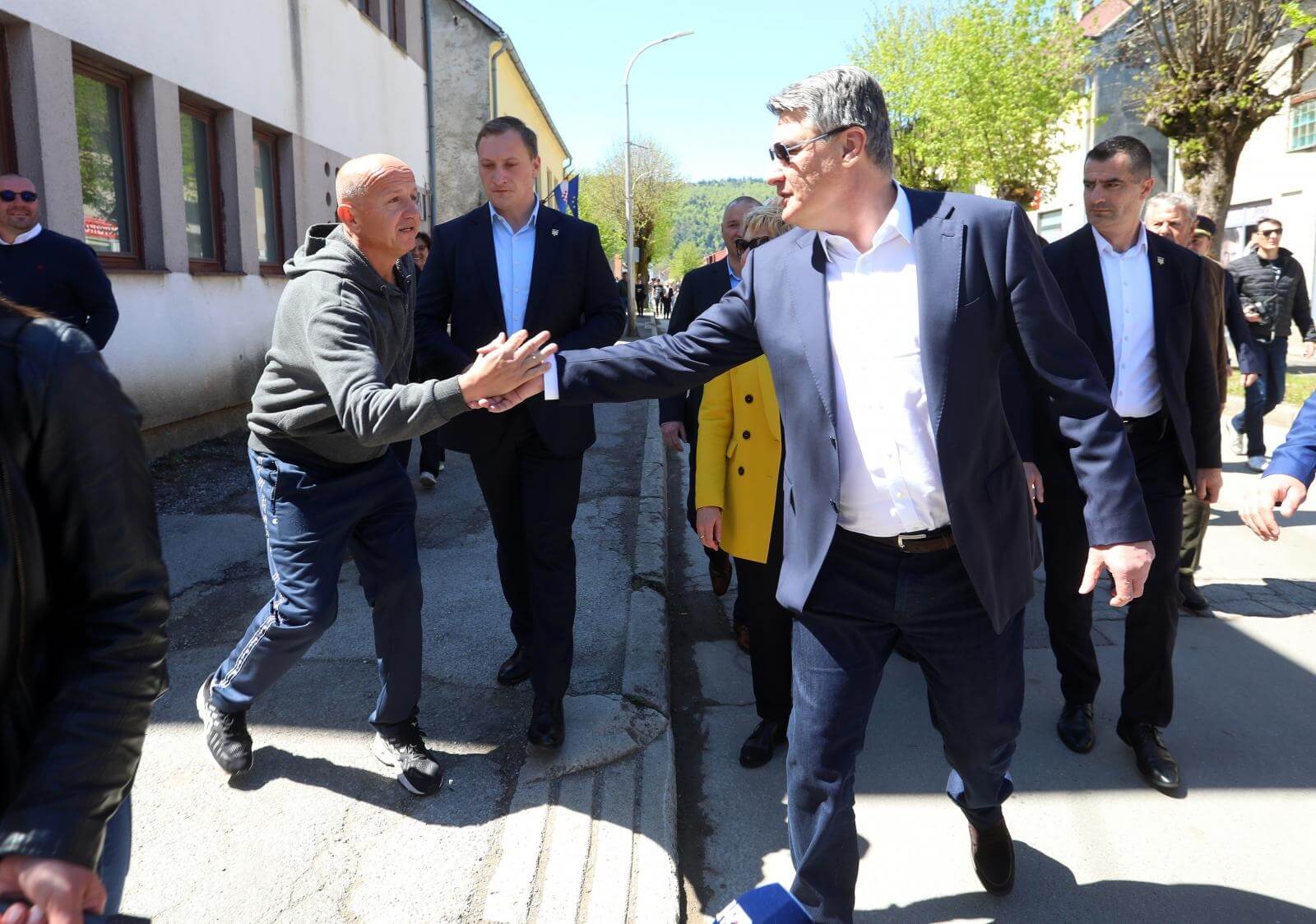
© Kristina Stedul Fabac/ PIXSELL
Croatian president Zoran Milanović visited Plaški county near Ogulin on Tuesday to visit the newly-build Firefighter's home and Plaški Culture Home. The locals welcomed president Milanović with ovations, and many use the opportunity to handshake and take a photo with the president. As Večernji List reports, Milanović took the visit as an opportunity to comment on the hate speech incident at Borovo Selo. He stated that the President of Serbian National Council Milorad Pupovac and Croatian Prime Minister „should use the police, but they don't, they are causing incidents.
Highlights of the Week: Pula celebrating its liberation in WW2
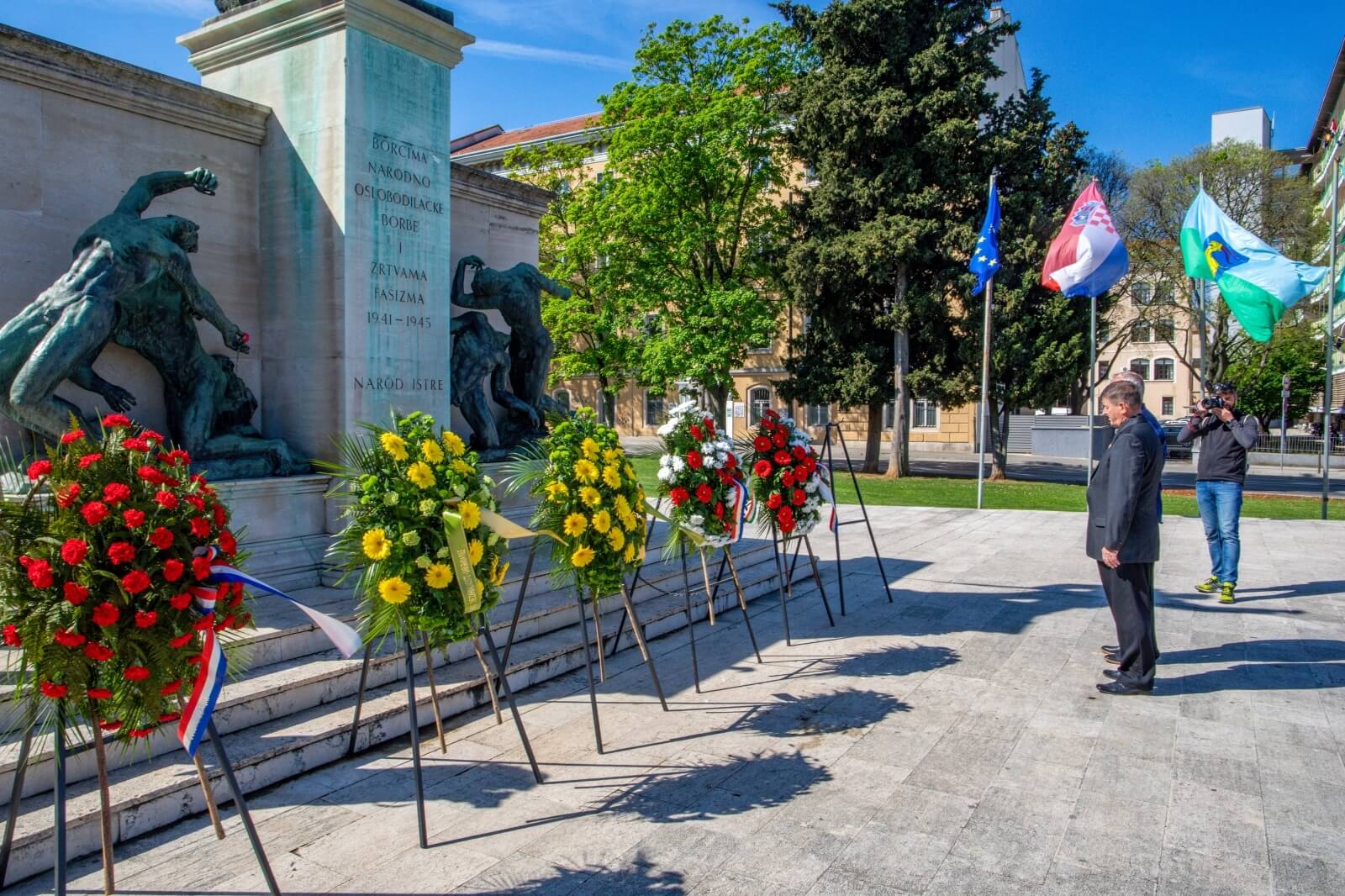
© Srecko Niketic/ PIXSELL
Pula celebrated its annual liberation day and the Pula City Day, marked on May 5. In Tito's park, the traditional commemoration to the fallen WW2 soldiers of Tito's partisan army saw Tiziano Sošić (president of Pula City Council), Elena Puh Belci (vice mayor of Pula), Aleksandar Matić (chief of the City of Pula Office) and Fabrizio Radin (vice-county ruler of Istria county) paid their respects. Representatives of associations of anti-fascist fighters and anti-fascist of the city of Pula were present too.
Highlights of the Week: Dinamo and Hajduk end with an even score 1:1
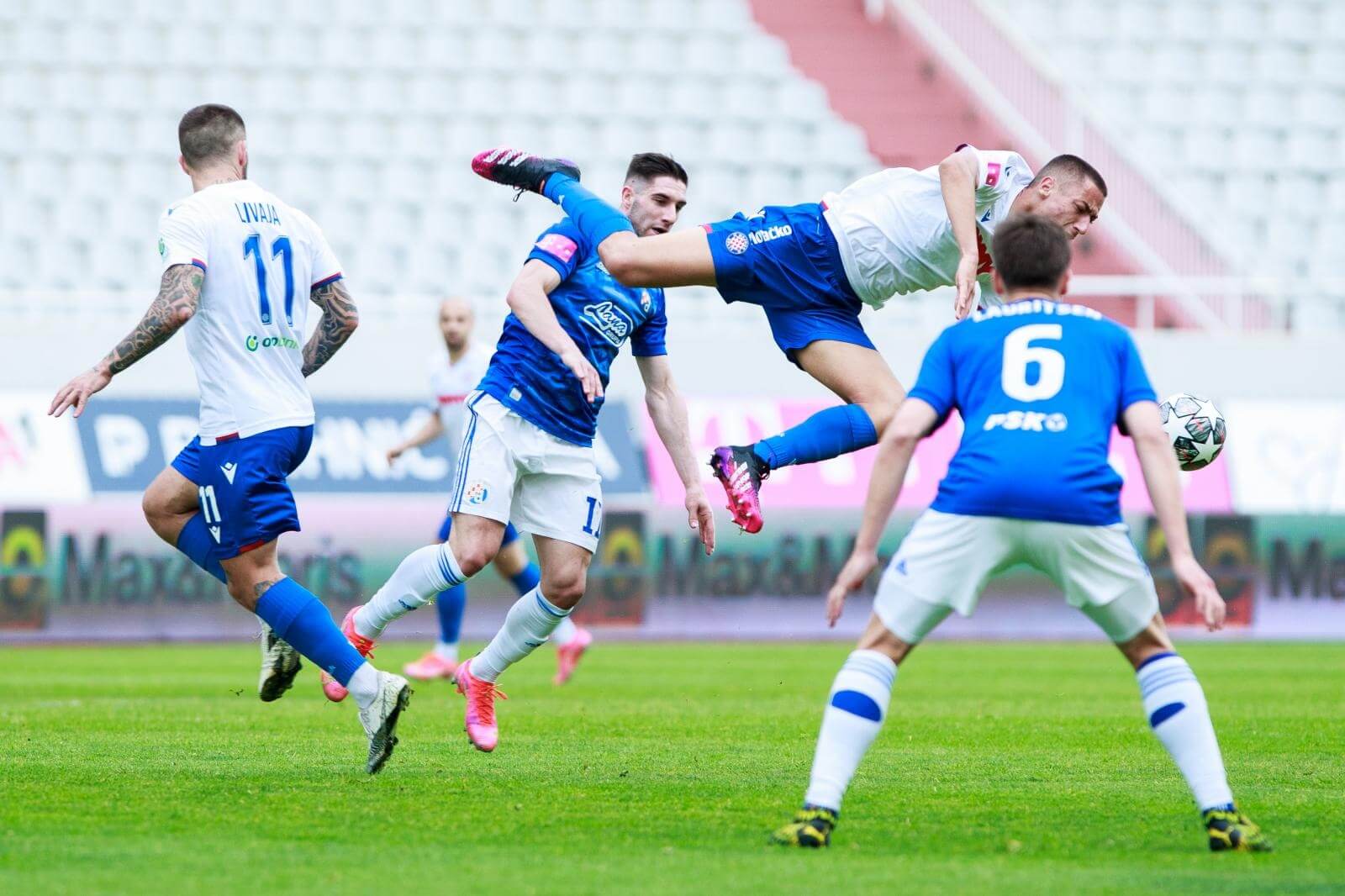
© Milan Sabic/ PIXSELL
Hajduk and Dinamo's eternal opponents played another game at Hajduk's home of Poljud Stadium in Split on Wednesday. The match was the 22nd round in Croatian First League, and fans couldn't wait for it as the game was postponed.
Hajduk opened the match well and had a chance to take the lead in the first 20 seconds. Kačaniklić received an excellent long ball and ran on the right side. He rushed into the penalty area and shot diagonally, but Livaković came out and closed his corner. Dinamo improved and took the lead in the 16th minute with a goal by Majer, and Livaja returned the favor in the 44th minute. Diamantakos hit the crossbar in the final minutes of the match but without success.
After three victories in the previous three clashes with Hajduk this season, Dinamo failed to achieve maximum performance and almost mathematically secured the title but entered the last four rounds with a seven-point advantage over Osijek. The fail happened despite Dinamo facing Hajduk with the strongest possible lineup.
Highlights of the Week: Vaccination in Šibenik continues successfully
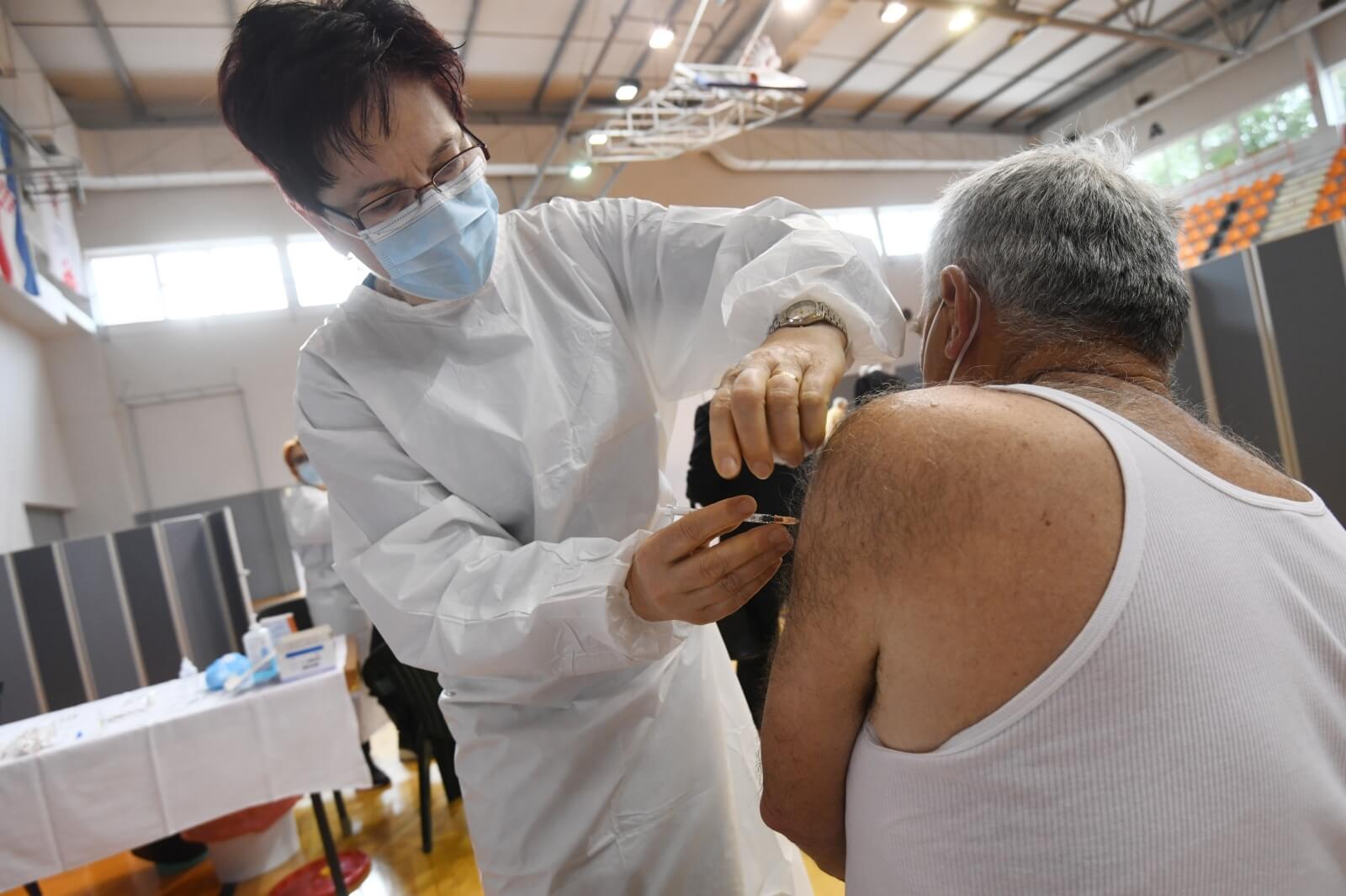
© Hrvoje Jelavic/ PIXSELL
Larger quantities of vaccines came to Šibenik on Friday, allowing vaccination in Baldeki Sports Hall to go without problems for the second day in the row. The vaccination attracts a number of citizens, so the area got quite crowded.
Highlights of the Week: Recycling yard in Zagreb on fire, reasons unclear
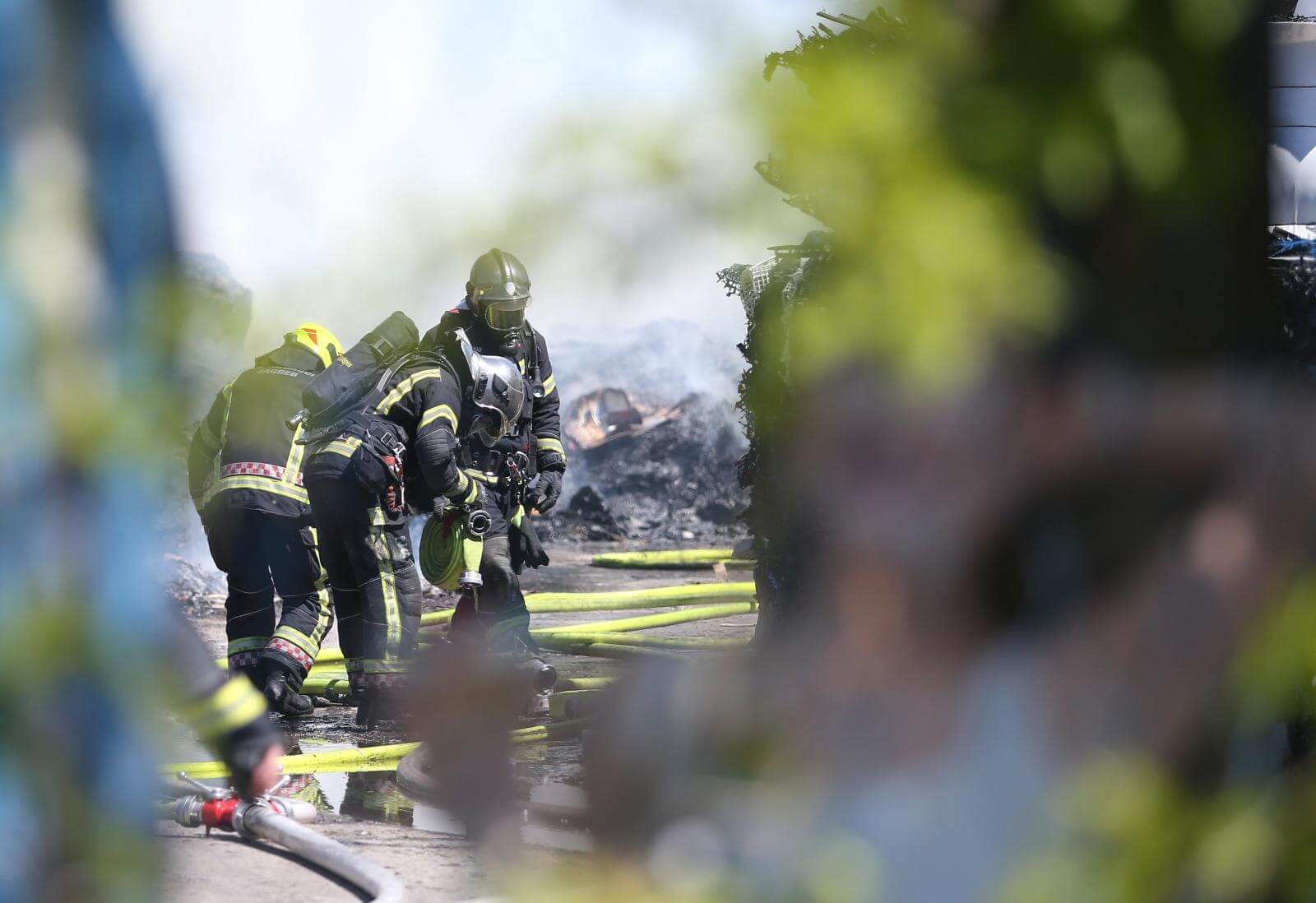
© Matija Habljak/ PIXSELL
Zagreb's recycling yard, located on Sarajevska Cesta in Novi Zagreb, was victimized by fire but quickly localized and put under control on Tuesday. The fire caught four containers, and 21 firefighters with six fire trucks rushed to the field. Police investigated the cause of the fire, but the reason is, for the moment, unknown. Firefighters managed to operate despite the lack of hydrants, and the thick white smoke was noticed by citizens who live in the buildings close to the yard, reported Večernji List.
To learn more about Croatia, have a look at our newly launched TC website.
For more about news in Croatia, follow TCN's dedicated page.
Epic Imagination! How Converted Mines Below Labin Istria Will Look
December 13, 2020 – An incredible reimagining of the mines that run deep below the centre of Labin Istria – the two-kilometre long complex will be accessed spectacularly via a see-through elevator
French writer Jules Verne liked to venture deep. The second most-translated author ever to have lived (between number one, Agatha Christie and number three, William Shakespeare – both British), his stories were quite often regarded as fantasy tales for children, owing to the poor, early transference of his French text into English. When read in his native tongue, he fantastical imagination, perhaps the roots of all science fiction, are better expressed. This is plainly evidenced in two of his most famous books, 20, 000 Leagues Under The Sea and Journey To The Centre Of The Earth.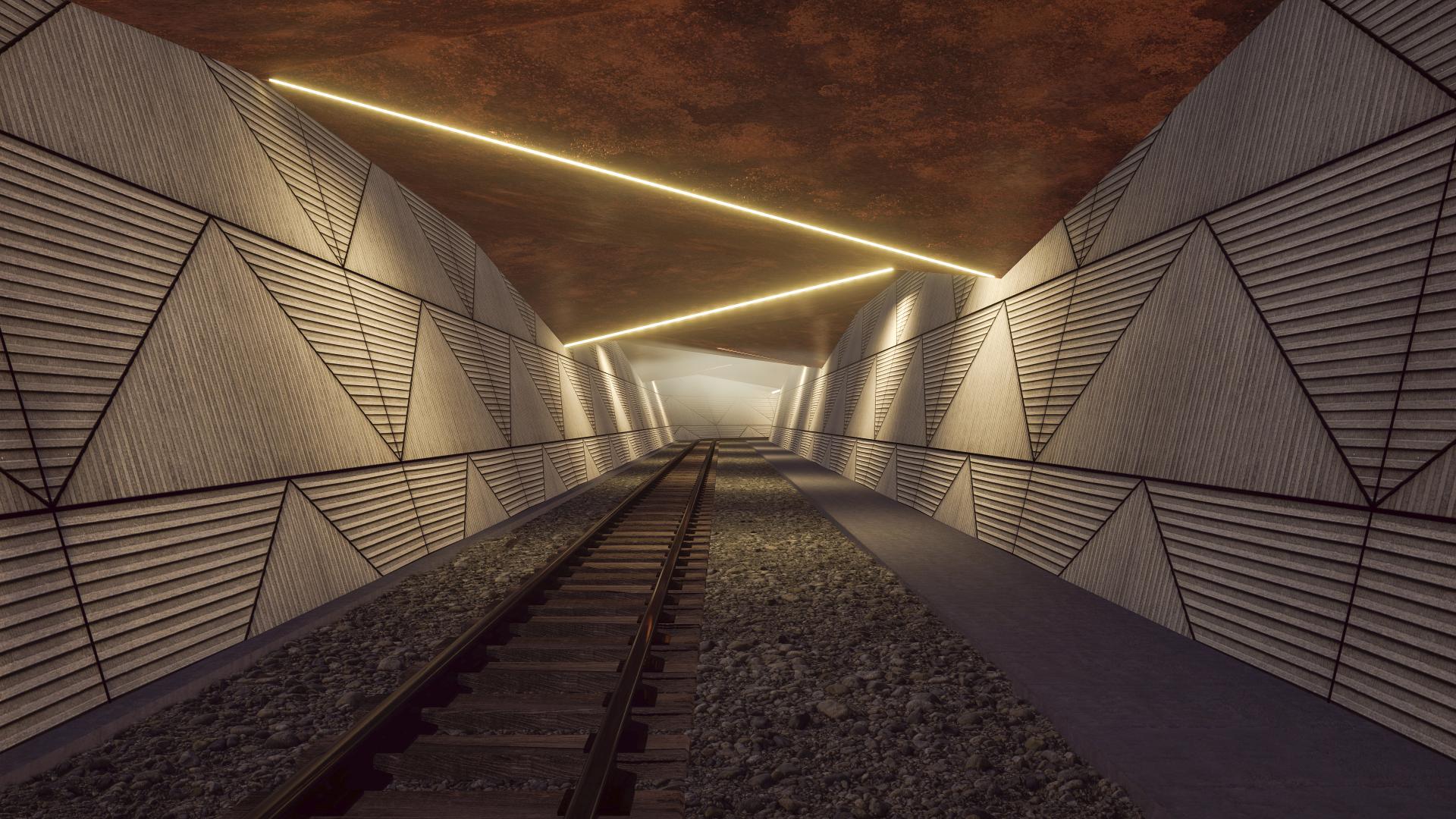
Jules Verne's inspiration can be found in physical form on the streets of Zagreb, where the 20, 000 Milja bar entertains with its submarine-themed décor. Though without any formal attribution, the project about to be undertaken by the town of Labin Istria could just as well be inspired by his other bestseller. Because, just as Jules Verne's journey to the centre of the earth was like no fantasy previously expressed, a limitless imagination seems to have gone into how the mines below Labin Istria will look once converted.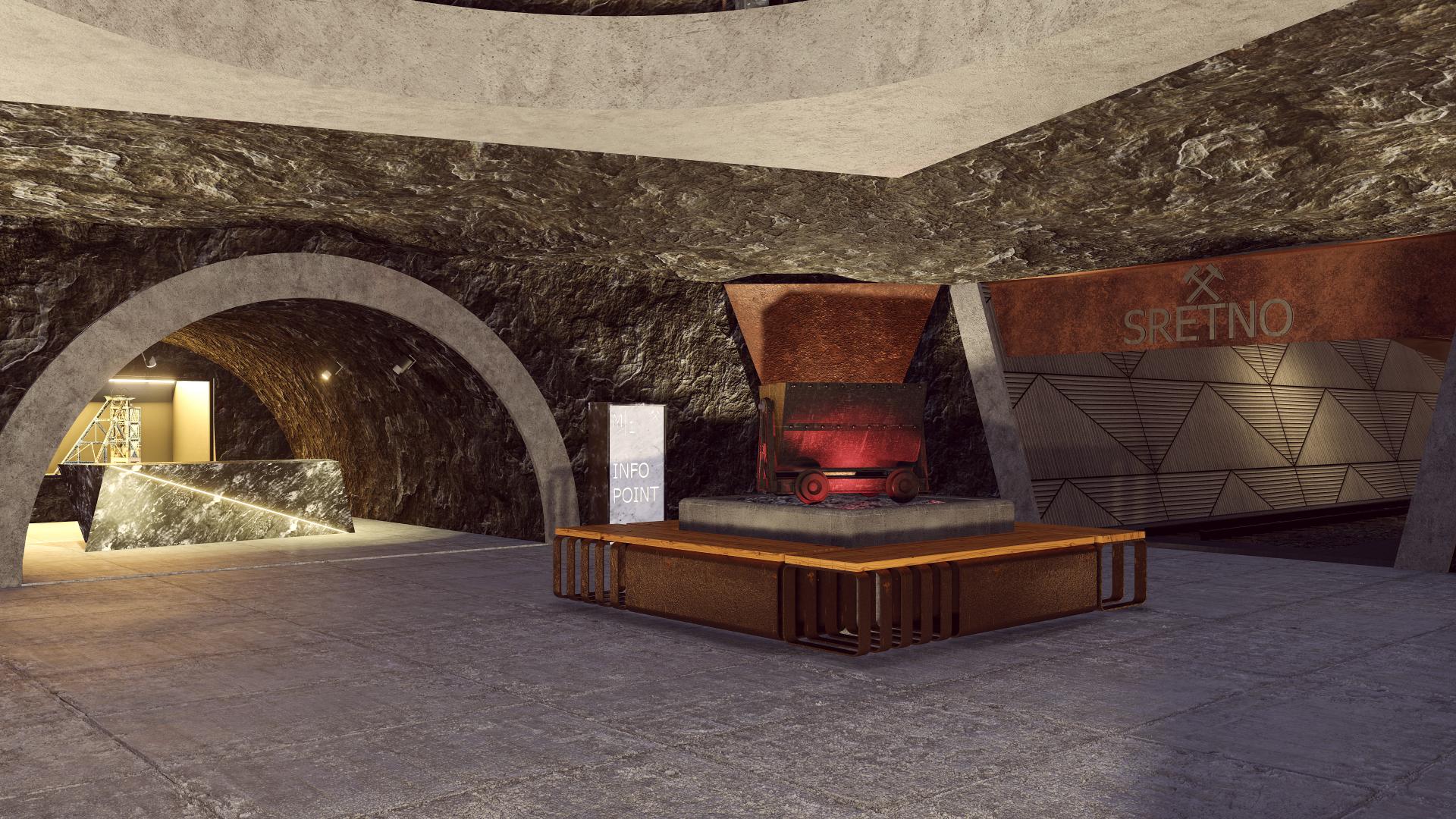
Newly revealed images display a visitor's space like nowhere else in Croatia. Though not quite at the centre of the earth, the new attraction lies some 166 metres below ground. The thrilling experience of a visit is set to begin before you even reach its entrance – access will be gained by a see-through elevator (lift).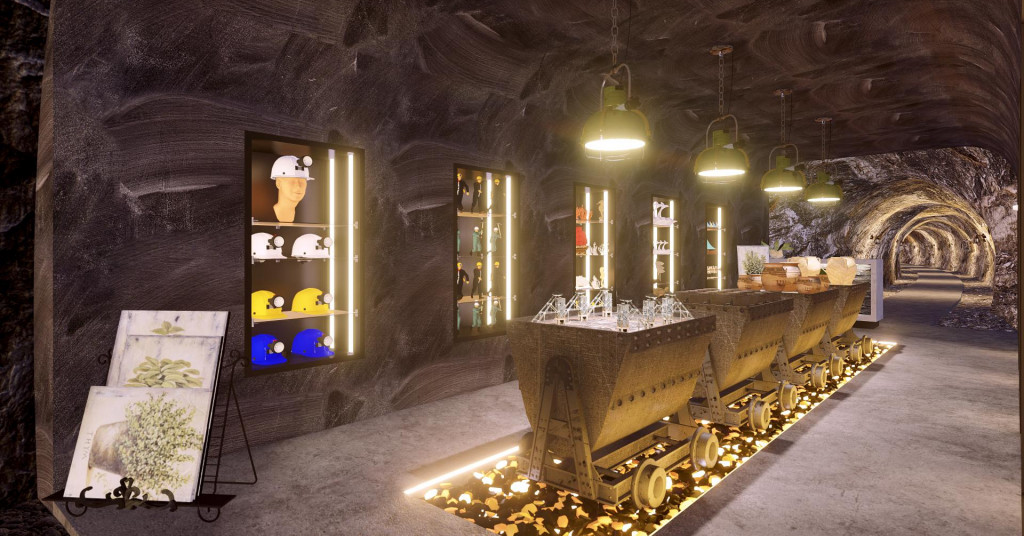
The attraction is set to be divided into five modules – entrance and information area, an art gallery for exhibitions and multimedia installations, an escape room entertainment area, an education zone with 360° projections, a gastro module, centring a wine cellar ( featuring local wines from Istria, which are among the most-prized of those produced in Europe – the mine conditions being perfect for their storage) and a gift shop where souvenirs from local producers, arts & craftsmen will be available.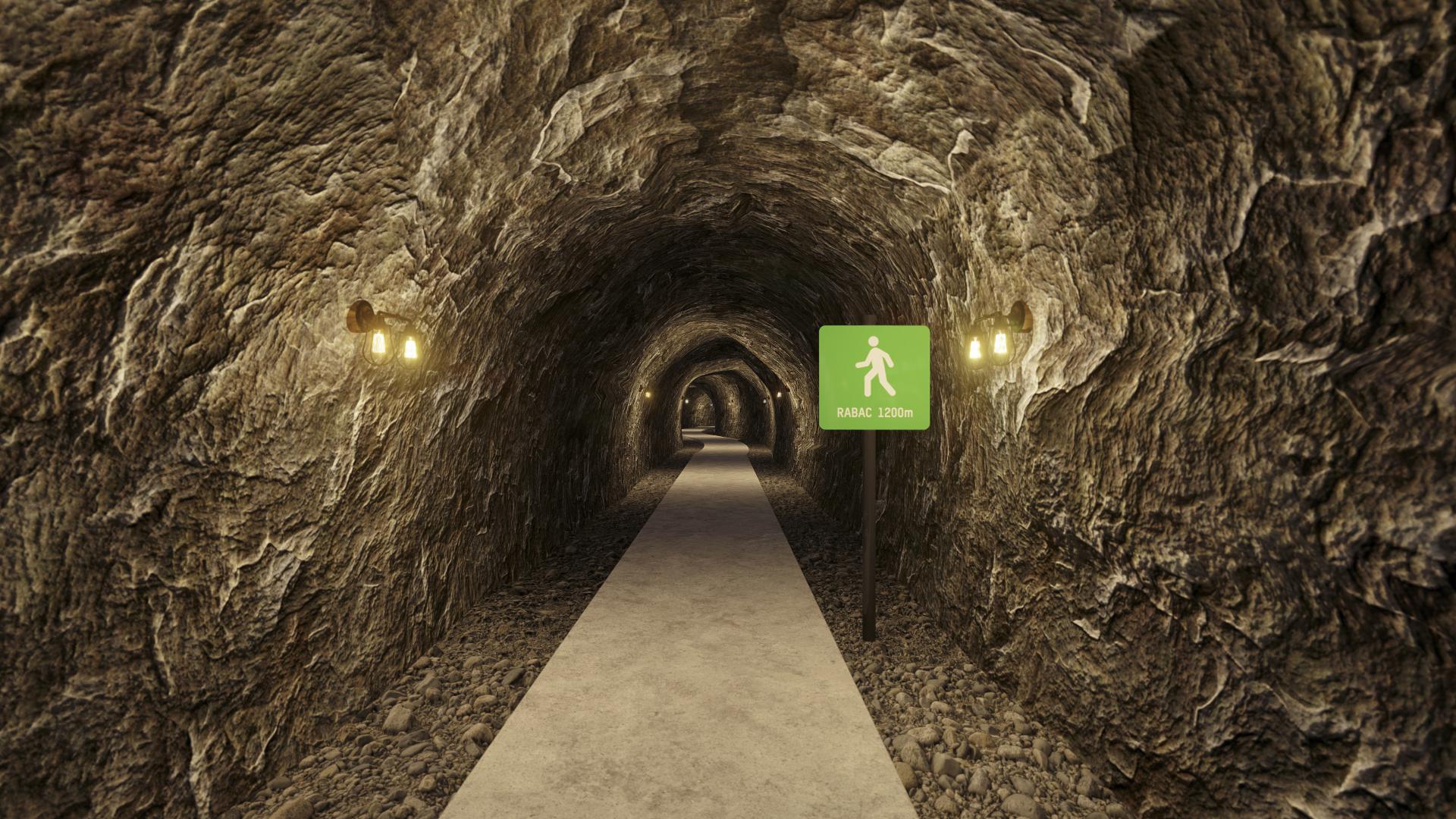
The sprawling complex is set to extend some two kilometres into the former mines of Labin Istria. That's no short walk! But, part of the route is being designed as a train ride, although the last section must be done on foot, due to the specific conditions of the tunnel.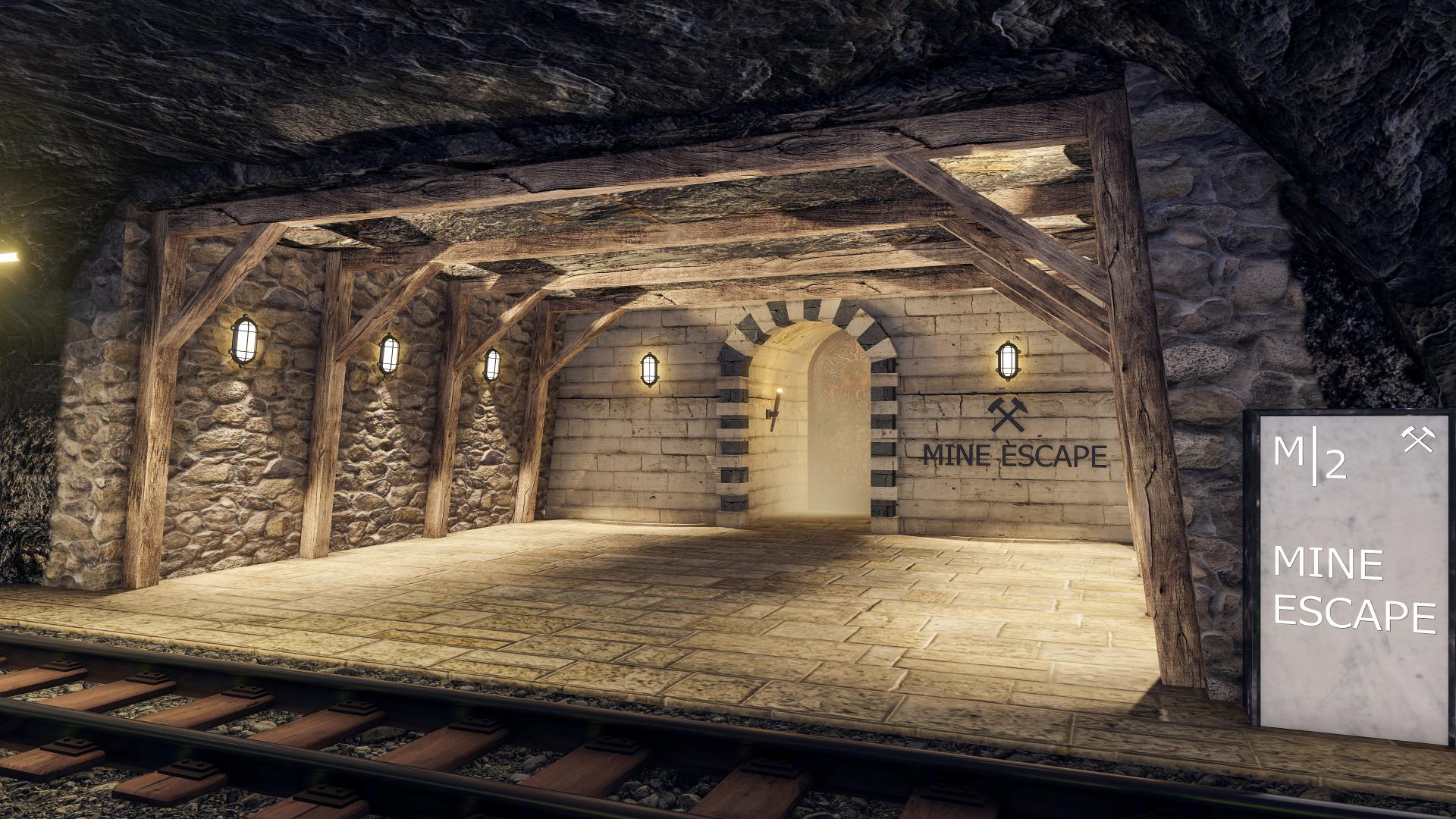
The town of Labin Istria was once the centre of mining endeavours in Croatia. At the height of its operations, some four mines operated in Labin Istria. In early 1921, the town was the scene of a miners' strike which quickly grew into an anti-fascist rebellion, a movement essential to securing Croatia's future independent state. It was the first of its kind and resulted in the declaration of the short-lived Labin Republic (also known as the Albona Republic). This particular mine, located in downtown Labin, was the last to close and did so in 1989. 2021 is the 100th anniversary of the Labin Republic, an anti-fascist struggle for which the town is extremely proud. It is hoped that works on the mine conversion will begin then.
All images © Level 52 / 3DX Studio / City of Labin
Local Authorities Observe Anniversary of Decision to Join Istria to Croatia
ZAGREB, September 13, 2019 - Delegations o the Town of Pazin and local anti-Fascist associations on Friday laid a wreath outside the building in Pazin in which on 13 September 1943, the Istria committee of the People's Liberation Movement decided on reintegration of Istria in Croatia.
Addressing the ceremony, a representative of the anti-Fascist associations, Tomislav Ravnić, said that events and people who fought for joining Istria to Croatia should never be forgotten.
In that struggle, 17,000 Istrians died, which is far more than "in the Homeland War, which was imposed on us", Ravnić said underscoring that he did not want to diminish the suffering caused during the 1991-1995 war.
Ravnić said that he condemned in the harshest terms the unveiling of the monument to Gabriele D'Anunnzio in Trieste and public activities of neo-Fascists in Rijeka.
There is no excuse for such events as they glorify the irredentism and Fascism, he added.
In September 1919 D'Annunzio proclaimed Rijeka as an independent state called the Italian Regency of Carnaro.
More info about the Second World War can be found in the Politics section.
Vandal Attacks Antifascist Monument, Ends Up in Hospital with Broken Leg
Early on Wednesday morning, at around 4.40 am, a monument to antifascist hero Rade Končar was damaged in a park at the Bačvice neighbourhood in Split, reports tportal.hr on November 7, 2018.
“A man knocked down the monument together with the pedestal,” reported the local police. They further confirmed that the monument fell on the vandal’s leg and injured him, so he ended up in a hospital for medical treatment, which has delayed the criminal investigation.
Rade Končar was shot by Italians in May 1942 for organising the antifascist resistance in Dalmatia.
The Split-Dalmatia County Police Administration knows the identity of the attacker but did not want to release it publicly. According to unofficial sources from the Split hospital, the perpetrator is a man in the mid-sixties. The monument fell on his leg and broke in, and he ended up in hospital.
President of the SDP branch in Split Goran Kotur said that the demolition of the monument was a shameful, cowardly and criminal act. “Unfortunately, this reflects an unhealthy climate that is persistently created in a part of our society. When the president says that the Ustasha slogan is an old Croatian greeting, and when there is no street dedicated to the partisans in Split, it is no wonder that pro-fascist vandals are taking things into their hands in such a miserable way. This is not the first anti-fascist monument to be demolished in Croatia. ‘Unknown perpetrators’ have destroyed some 3,000 monuments since 1990, with no fear that anyone will ever discover and punish them. Anti-fascism as a civilization value is not a thing of the past, but it is very much needed today, when fascism, which has done so much evil to Split, Croatia, Europe and the world, is strengthening again,” Kotur wrote.
The incident was also condemned by the office of Split Mayor Andre Krstulović Opara. “We strongly condemn the demolition of the monument to Rade Končar. We are sure this is an act done by an irresponsible individual and does not express the opinion of citizens of the free and tolerant Split who condemn such vandalism and savagery. We believe that the competent institutions will appropriately punish the perpetrator. The town of Split has hired a company which will, after the police investigation is over, repair the damage to the monument,” said the mayor’s office.
Translated from tportal.hr (reported by Damir Petranović).
To read more about Split, click here.
Antifascist Anniversary Marked in Split
ZAGREB, August 26, 2018 - A wreath-laying ceremony was held on Sunday in Split to mark the 77th anniversary of the death of 24 fighters of the 1st Split Partisan Detachment and the 1st Solin Partisan Detachment, executed on 26 August 1941 after they were court-martialled by the Independent State of Croatia.


